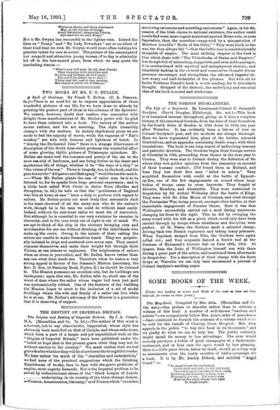THE DESTINY OF IMPERIAL BRITAIN.
The Origins and Destiny of Imperial Britain. By J. A. Cramb, M.A. (Macmillan and Co. 7s. 6d.)—The author of this work is a fervent, not to say chauvinistic, Imperialist, whose style has obviously been modelled on that of Carlyle, and whose reflections, which form a part of a larger and yet unpublished work on the 4` Origins of Imperial Britain," have been published under the "belief or hope that in the present grave crisis they may not be without service to his country." We must confess that we feel grave doubts whether they will be of service to the thoughtful reader. We hear rather too much of the "eternities and immensities,' we find none of the practical suggestions which the thinking Englishman of to-day, face to face with the grave problems of empire, most eagerly demands. Nor is the Imperial problem to be solved by indiscriminate abuse of the "Black League of Loyola
• undeviating in its worship of the three strange Graces, —Treason, Assassination, Calumny," or of France,which "crouches muttering calumnies and scrawling caricatures." Again, in his dirt cussion of the Irish claims to national existence, the author could surely find some more cogent argument against Home-rule, or even Separation, than the assertion—supported by a misquotation of Matthew Arnold's "Motto of the Celts," "They went forth to the war, but they always fell "—that the Celtic race is constitutionally incapable of empire. The most striking chapter in the book is that which deals with "The Vicissitudes of States and Empires,' but though full of interesting, suggestive, and even noble passages, it is overburdened with mystical and metaphysical rhetoric, and singularly lacking in the ordered and consecutive thought whose presence encourages and strengthens the educated Imperia'ist, now weary and half-disdainful of fine phrases. But with all its faults Professor Crarnb's book is worth reading, for it stimulates thought. Stripped of the rhetoric, the underlying and essential idea of the book is sound and wholesome.






































 Previous page
Previous page